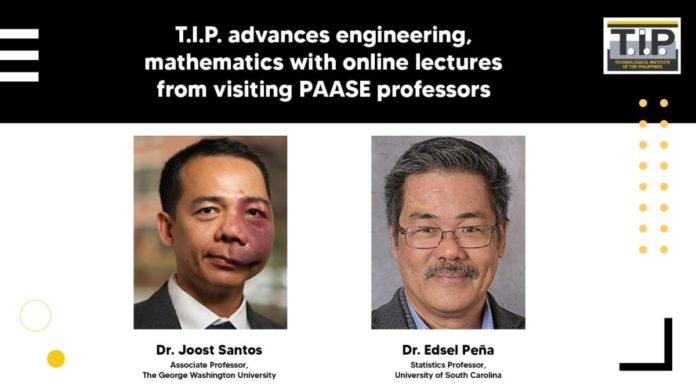After signing a landmark partnership agreement last January, the Technological Institute of the Philippines (T.I.P.) and the Philippine-American Academy of Science and Engineering (PAASE) have gotten the ball rolling to advance engineering and mathematics amongst the youth.
Two esteemed PAASE members have so far served as guest lecturers in T.I.P.’s undergraduate and graduate programs, sharing the knowledge they have amassed through extensive years of practice.
“I gladly accepted the offer to be a visiting professor because teaching is something that I am truly passionate about, and also because of the opportunity to train a cohort of Filipino students across the globe. I felt that this would enable me to contribute something meaningful to the Philippines,” said Dr. Joost Santos, who taught a 6-week online course on operations research and optimization techniques in T.I.P. Quezon City’s Professional Science Master’s (PSM) Degree in Construction Management program.
An industrial engineer and associate professor at The George Washington University – School of Engineering and Applied Sciences, Santos has been involved in various critical infrastructure projects in the fields of transportation, electric power, and oil/gas process control systems. His specializations include financial engineering, disaster risk management, and infrastructure interoperability, and multi-criteria decision analysis.
“The level of academic aptitude and intellectual curiosity of T.I.P.ians was impressive. It was very satisfying to see how they successfully solved problems on topics that were new to them,” Santos shared.
On the role of statistics in data science
Dr. Edsel Peña, a statistics professor at the University of South Carolina, meanwhile held a one-time virtual lecture attended by T.I.P. faculty, students, and employees.
In his talk, Peña underscored the importance of statistics in what is considered one of today’s hottest and fastest booming industries: data science. Simply put, data science is math, business, and information technology combined altogether.
Social media, Peña said, “has ushered in the era of big data, and we need statistics to understand and summarize all these.” He cites the case of election polls and the ongoing worldwide vaccination against Covid-19: “We can’t get the whole population; but a good, unbiased sample can give us a measure of the pulse of the people.”
Peña, who is also program director of the US National Science Foundation, likewise welcomed the idea of offering a data science undergraduate program, noting that “there’s a great need for data scientists especially in the Philippines.”
Last year, at the height of the pandemic, T.I.P. – in partnership with the US Agency for International Development (USAID), its Science, Technology, Research and Innovation for Development (STRIDE) program, CloudSwyft Global Systems Inc., and Emerson Philippines – launched its Professional Science Master’s Degree in Data Science, the first in Metro Manila.
“It is not every day that we are a direct recipient of lectures especially tailored for us by professors of such caliber and stature. We are truly blessed to have them share their expertise with our students, and we hope to engage with other equally brilliant minds from PAASE in the future,” said T.I.P. president Dr. Elizabeth Quirino-Lahoz.
PAASE is a non-profit organization composed of scientists and engineers of Philippine descent who have distinguished themselves in scholarly and research-related activities. It has over 230 members worldwide specializing in diverse fields of study, including physics, chemistry, biology, medicine, mathematics, computer science, and engineering. Learn more about PAASE by visiting paase.org/about-us.
For more information on T.I.P., visit tip.edu.ph or T.I.P. ‘s official social media accounts through @TIP1962official for Facebook, Twitter, and Instagram.
